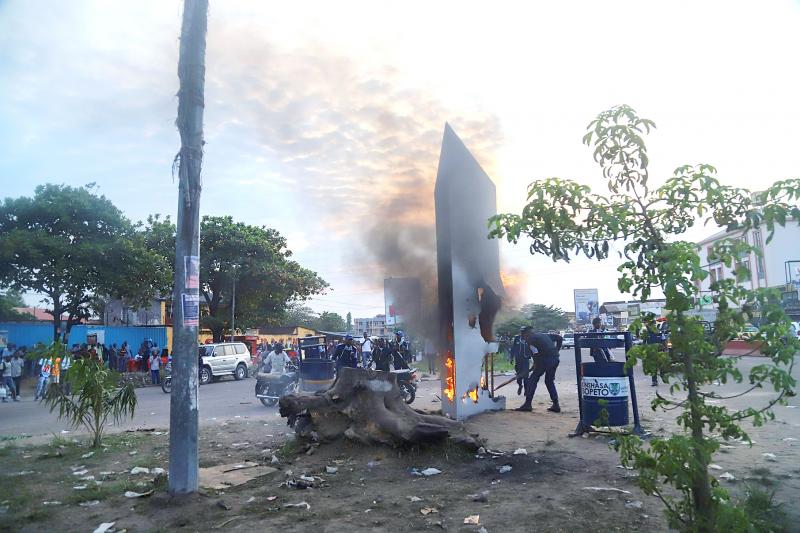The latest in a series of mystery monoliths to capture the imagination of science-fiction fans around the world on Wednesday met a fiery end in the Democratic Republic of the Congo (DR Congo) when it was torched at a roundabout in the capital.
The 3.66m metallic structure first appeared in Kinshasa’s Bandal neighborhood on Sunday.
On Wednesday morning, a crowd of curious onlookers snapped selfies and debated its possible origins.

Photo: Reuters
Videos posted on social media later in the day showed people destroying the structure with sticks and then setting it on fire.
Similar pillars were spotted in a Utah desert in the US in November last year, and then in Romania and Turkey, sparking conspiracy theories and comparisons to the monoliths in Stanley Kubrick’s 1968 film 2001: A Space Odyssey.
In the movie, an alien monolith is a recurring symbol.
“We woke up and saw this metallic triangle,” said Serge Ifulu, a local resident. “We were surprised, because it is a triangle that we often see in documentaries about freemasons or illuminati.”
Similar mysteries have gone viral on Congolese social media before.
In August last year, an unidentified flying object was parachuted into dense jungle in the north of the country, briefly baffling local authorities.
Local authorities detained two people for questioning until a subsidiary of Google parent company Alphabet confirmed that the device was an Internet balloon.
This time again, extraterrestrial intervention appeared unlikely.
Residents said that they saw people digging a hole at the roundabout on Saturday.
“On Sunday morning, I got a call when I was doing some sport to tell me they found something strange. I came and I said: ‘This is cultural, it’s extraordinary,’” neighborhood mayor Thierry Gaibene said.

POLITICAL PATRIARCHS: Recent clashes between Thailand and Cambodia are driven by an escalating feud between rival political families, analysts say The dispute over Thailand and Cambodia’s contested border, which dates back more than a century to disagreements over colonial-era maps, has broken into conflict before. However, the most recent clashes, which erupted on Thursday, have been fueled by another factor: a bitter feud between two powerful political patriarchs. Cambodian Senate President and former prime minister Hun Sen, 72, and former Thai prime minister Thaksin Shinawatra, 76, were once such close friends that they reportedly called one another brothers. Hun Sen has, over the years, supported Thaksin’s family during their long-running power struggle with Thailand’s military. Thaksin and his sister Yingluck stayed

In the sweltering streets of Jakarta, buskers carry towering, hollow puppets and pass around a bucket for donations. Now, they fear becoming outlaws. City authorities said they would crack down on use of the sacred ondel-ondel puppets, which can stand as tall as a truck, and they are drafting legislation to remove what they view as a street nuisance. Performances featuring the puppets — originally used by Jakarta’s Betawi people to ward off evil spirits — would be allowed only at set events. The ban could leave many ondel-ondel buskers in Jakarta jobless. “I am confused and anxious. I fear getting raided or even

Kemal Ozdemir looked up at the bare peaks of Mount Cilo in Turkey’s Kurdish majority southeast. “There were glaciers 10 years ago,” he recalled under a cloudless sky. A mountain guide for 15 years, Ozdemir then turned toward the torrent carrying dozens of blocks of ice below a slope covered with grass and rocks — a sign of glacier loss being exacerbated by global warming. “You can see that there are quite a few pieces of glacier in the water right now ... the reason why the waterfalls flow lushly actually shows us how fast the ice is melting,” he said.

Residents across Japan’s Pacific coast yesterday rushed to higher ground as tsunami warnings following a massive earthquake off Russia’s far east resurfaced painful memories and lessons from the devastating 2011 earthquake and nuclear disaster. Television banners flashed “TSUNAMI! EVACUATE!” and similar warnings as most broadcasters cut regular programming to issue warnings and evacuation orders, as tsunami waves approached Japan’s shores. “Do not be glued to the screen. Evacuate now,” a news presenter at public broadcaster NHK shouted. The warnings resurfaced memories of the March 11, 2011, earthquake, when more than 15,000 people died after a magnitude 9 tremor triggered a massive tsunami that